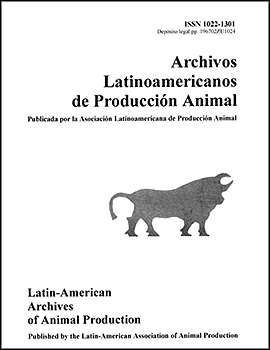
|
Archivos Latinoamericanos de Produccion Animal
Asociacion Latinoamericana de Produccion Animal
ISSN: 1022-1301
EISSN: 1022-1301
Vol. 14, No. 4, 2006, pp. 148-153
|
 Bioline Code: la06026
Bioline Code: la06026
Full paper language: Spanish
Document type: Research Article
Document available free of charge
|
|
|
Archivos Latinoamericanos de Produccion Animal, Vol. 14, No. 4, 2006, pp. 148-153
| en |
Social and productive characteristics of small and medium - sized swine farmsin Caseros Department, Santa Fe Province, Argentina
Campagna, D.; Zapata, J. A.; Somenzini, D.; Martinez Eyherabideo, C. & O'Duyer, P.
Abstract
This is an exploratory study of the social and productive characteristics of the small and medium sized swine production enterprises of Argentina. Sampling took place in the Department of Caseros, which is representative of the swine industry in the country as a whole due to the importance of its production and to the prevailing type of system (complete cycle outdoors). Only three of the 328 swine farms included use total confinement; 69% possess fewer than 51 breeding sows, and 74.6% complete the full cycle (farrowing to finishing). One hundred and six farms, representative of each stratum of producers defined by the number of breeding sows), were chosen at random. These producers were interviewed during May to August, 2000, and the data were updated in May, 2005. The interviews showed that these enterprises employ three times as many people as large-scale production units. These, who are largely both agricultural and swine producers, make a living from their farms. The production data reveal low performance levels, of both finishing animals and breeding sows on these farms. Characterization of these small and medium-sized producers that began with this study will facilitate implementation of any program destined to promote this activity. The description achieved in the present effort will also enable prioritizing variables to be measured in future studies.
|
| |
| es |
Características sociales y productivas de las pequeñas y medianas empresasporcícolas del Departamento Caseros - Santa Fe- Argentina.
Campagna, D.; Zapata, J. A.; Somenzini, D.; Martinez Eyherabideo, C. & O'Duyer, P.
Resumen
En este estudio exploratorio se describen las características sociales y productivas de las pequeñas y medianas empresas porcícolas argentinas. El muestreo se realizó en el Departamento de Caseros que, por la gran magnitud de su producción y por el tipo de producción predominante (sistemas de ciclo completo a campo) lo hacen representativo a nivel nacional. De los 328 establecimientos con producción porcina identificados, sólo tres son sistemas totalmente confinados; el 69% posee menos de 51 cerdos madres y el 74.6% son de ciclo completo. De este total, fueron elegidos al azar y en forma representativa por cada estrato de productores (definido a partir de la cantidad de cerdas madres) 106 establecimientos. A éstos, en el período de mayo a agosto del 2000, se les sometió a una cédula de entrevista, información que fue actualizada en mayo de 2005. Las encuestas revelaron que estas empresas ocupan tres veces más personal que las grandes unidades de producción. Además, estos productores que, mayoritariamente son agrícola-porcinos, viven de los ingresos del campo. Los datos de producción señalan el bajo desempeño animal tanto en los engordando como en las hembras reproductoras de estas empresas. La caracterización de estas pequeñas y medianas empresas a partir de este trabajo facilitará la implementación de cualquier programa tendiente al desarrollo de esta actividad. La descripción aquí lograda dará lugar también a la jerarquización de variables a ser medidos a campo en trabajos posteriores.
Palabras-clave
características sociales, Caseros, empresas medianas, empresas pequeñas, granjas procícolas
|
| |
© Copyright 2006 - ALPA. Arch. Latinoam. Prod. Anim.
Alternative site location: http://www.alpa.org.ve/ojs/index.php
|
|
